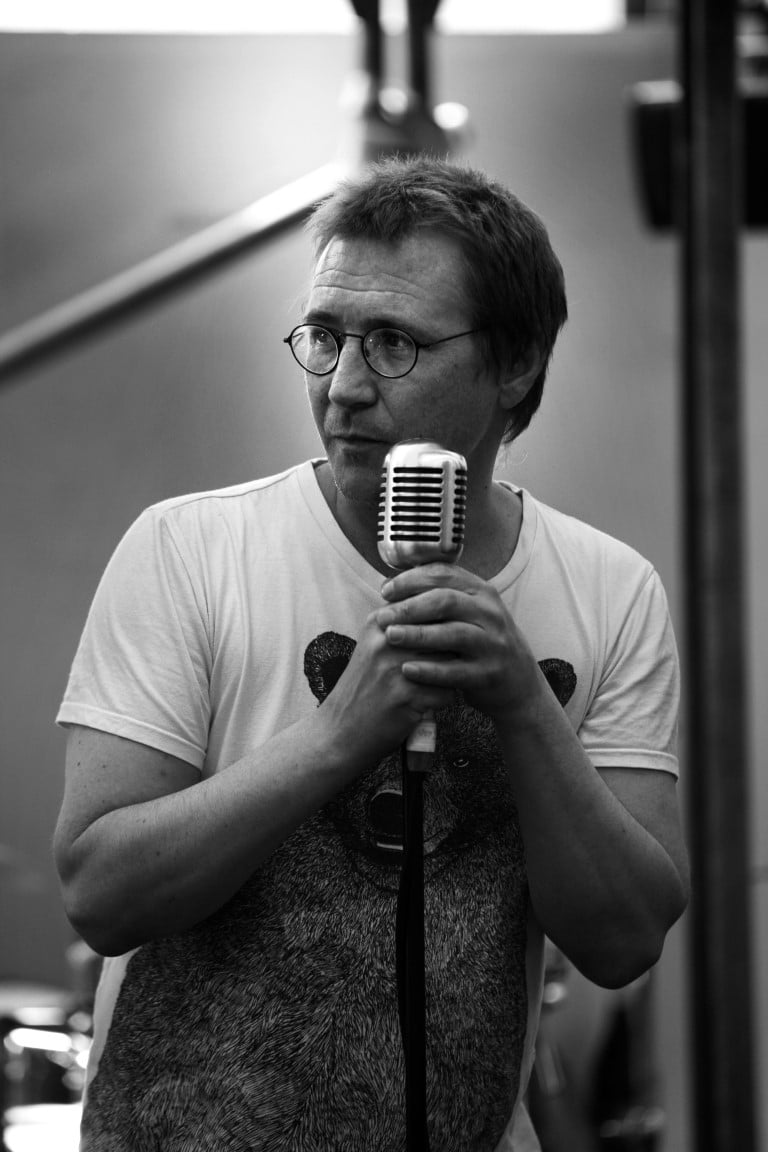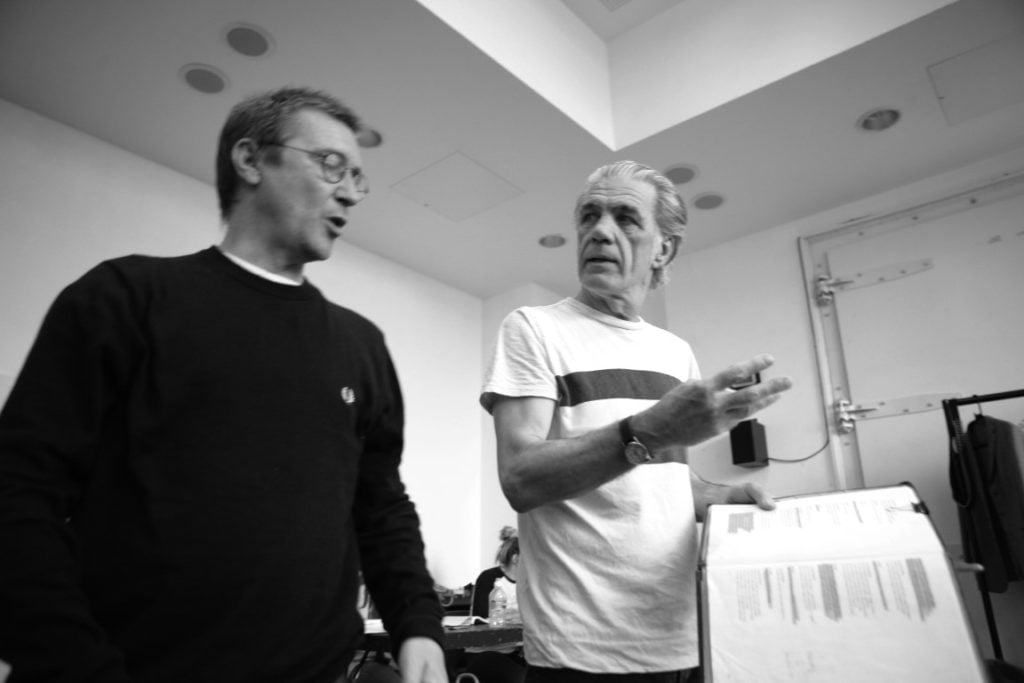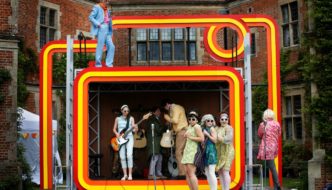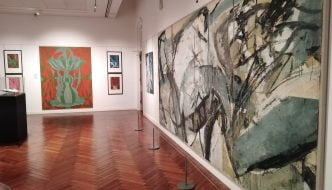The Two Gentlemen of Verona with Everyman Associate Director Nick Bagnall
October 19, 2016

Director Nick Bagnell in rehearsal for The Two Gentlemen of Verona. Photo Credit: Gary Calton
As I sit waiting to interview Nick Bagnall in the Everyman café, I watch as the theatre staff routinely queue for their morning coffee. Nick suddenly appears, bounding down the stairs. He’s had his coffee and his breakfast in the Green Room and he’s ready to go. He speaks animatedly, a mixture of caffeine and hype from the success of his latest show: “Hey, man. Is it you? Great! I’m glad! How you doing? Fancy a drink? Tea? Coffee? I’m gonna get another coffee.” He heads off to the bar.
When he sits back down, I explain my premise for the interview. I imagine that he’s sick and tired of explaining to interviewers precisely why he set his production in the 60’s (“Not at all,” he says, the hype undiminished). Instead, I’d like to talk about the meat and bones of his new production which he himself once described as a play about “…some letters, a dog and a rape.”
“Okay!” His eyes light up slightly, “Let’s do that…”
So, Nick, I suppose we ought to start at the beginning and ask: Why The Two Gentlemen of Verona? Why this play above all the others?
Because it’s hardly ever done, so nobody has any preconceptions about it. It’s a problematic play, so you can do whatever the hell you like with it. And it’s Shakespeare’s earliest play, so he’s touching on themes that he’ll come to explore at a deeper level later on in his work: disguise, gender, betrayal, deception, love… So it felt like there were lots of things to play with.
It also felt like one of those plays that I could do a big number on, and I was always really keen on finding a way to do a Shakespeare in which the music drives the narrative. There was an early conversation about The Merry Wives of Windsor, which I didn’t want to do because I couldn’t find a way of doing it musically. But, essentially, [Artistic Director of Shakespeare’s Globe] Emma Rice was really keen for me to do a play that allowed me to have some fun theatrically. And scholars and purists haven’t seen too much of it, which means that—as part of her first season at The Globe—we could put a real stamp on it.
So that ability to play about and reinterpret was really important to you?
Yeah, absolutely. I’ve done lots of stuff with The Globe—most of it a long time before Emma’s arrival—and I’ve always done that, I’ve always reinterpreted. Every play’s a new play. That being said, when I did A Midsummer Night’s Dream, I found that to be one of the most robust plays I’ve ever read. So intricate, so delicate, so beautiful and so, so robust. I only cut half an act from Midsummer: I couldn’t cut any more than that and I didn’t want to. Two Gents ain’t that. It’s a playwright, very early in his career, messing about with theatre. I mean, I’ve cut Act Four down to two songs! I didn’t want to do Two Gents at first. I didn’t think the play was good enough, I couldn’t find any love for it. But after I started auditioning and had a conversation with [Composer] James Fortune and started to realise that the concept of setting it in the 60s—and everything that brings with it: the look, the style, the aesthetic—could work, I started to fall in love with it. The 60s thing, which I know we’re not going to dwell on, became a hook on which to hang the rest of the play.
I’m going to do another Shakespeare next year and I plan to really smash that apart, as well. I’m going to push myself to see just how contemporary I can make it.
Is there any reverence for Shakespeare, then, or is he just one of many playwrights?
I have no reverence whatsoever when it comes to Shakespeare and I don’t think he’d want me to. I’ve had a lot of telling-off and finger-wagging because I’ve put a bit of rock ‘n’ roll into Shakespeare but, I mean, come on: if he was around today he’d be using every trick he possibly could to capture an audience’s attention…
Even if you just look at his use of language, whether that’s verse or prose, Shakespeare’s as much a musician as he is a writer, isn’t he?
Yeah, absolutely! Absolutely! He uses song, he uses dance, he uses direct address. Every trick in the book. So, no: I have no reverence for him. And why should we? I’ve seen some incredible original-practice Shakespeares, but a lot of that is down to the quality of the actors. When I did the Henry VI trilogy for The Globe and that was very traditional—armour and swords—but I used music and song throughout. Particularly during the period of Two Gents, Shakespeare’s young and he’s writing on the hoof. He’s writing for a company of actors…
…And a producer that needs a script for this time next week…
Exactly. He makes a lot of mistakes. There are lots of playwrights that I am reverential about: Pinter, Beckett, Orton. But early Shakespeare isn’t one.

Let’s go back to what you’ve mentioned a couple of times about the fact that The Two Gentlemen of Verona is thought to be Shakespeare’s first professional play. It’s a youthful piece of work that definitely acts as a blueprint for Romeo and Juliet. Is it his teenage play?
Yeah, it is. In many ways. I think that it’s a very honest teenage play in which the characters themselves are teenaged and are making terrible mistakes, as we all did at that age. But my production is also full of love and song and dancing and has a real festival vibe to it. I think it’s very young in its outlook and, I have to say, a very naïve play. And that’s why it’s great for a director.
And that naivety, I think, is what makes it so authentic. Rape culture, misguided male affection, young girls falling head-over-heels in love only to be treated as gifts and playthings. This is a very dark, realistic play about teenagers from a writer who died 400 years ago.
Yeah, and those things appear again and again throughout his work until the day he dies—that male-dominated world. But you can’t do the end of this play the way it’s written in front of a modern audience. You just can’t. I had five different endings for this play, and I went with the one that I did because it was very serendipitous that Janice Joplin’s first big hit came out in 1966, ‘All is Loneliness’. In the film version, those boys get on a tour bus and fuck off—they might as well marry each other. But you can’t get away with it in this day and age and I didn’t want to. It’s like The Taming of the Shrew: the women lose their voice at the end of the play, but then it’s all tied up and everybody gets married. But I, as a director, just couldn’t allow that to happen.
And did you try out the original ending?
Yeah, we did. But I wasn’t brave enough to do it, weirdly. I was going to stop the show and then do the original ending as Shakespeare intended and then I was going to rewind and go for it Ken Loach-style. But it just felt so stupid. Then there was another ending in which Proteus gets a guitar over his head, but we couldn’t make that anything but silly. But then, eventually, I found this Joplin tune and just thought ‘This is it’ because it ends with the women, and it needs to end with the women. I think I’m proudest of Two Gents, more than anything I’ve directed, because I haven’t shied away from it and I’ve made a real gut-punch of an ending for a play that has no gut-punch.
Can we talk a little bit about Proteus, and chart his journey through the play from devoted best friend to attempted rapist…
…And getting away with it.
…And getting away with it. He’s a character with the initial constancy of a Mercutio or a Benvolio, but with real sinister elements of a future Iago.
Definitely. He is a really early version of Iago, but he’s just not written well enough. I think that there’s a really simple answer to a lot of questions about Proteus: he’s young, dumb, and full of cum. He makes terrible, teenage mistakes. The attempted rape itself is disgusting, it’s unforgivable—hence why we did the ending that we did. He goes into that forest with a raging hard-on and Shakespeare continues to write him as a villain. Shakespeare’s very naïve at this point and Proteus’ journey isn’t particularly complicated. There’s a brilliant play by Pinter called Betrayal, and the biggest betrayal in that play is between the men. That’s what Proteus does. His biggest betrayal in the entire play is the betrayal of his best mate.
Building from that, let’s talk about Shakespeare’s clowns, particularly Launce and his dog Crab, which is possibly the play’s only genuine friendship. How do you approach the character of the clown in rehearsal, and deal with material that isn’t particularly funny by today’s standards?
You make it funny by casting an incredible actor that can hold an audience in the palm of their hand, keep them there, and then play about with them. I really like Launce and you’re right, his and Crab’s friendship is very genuine and very special. Launce has a great line in the play—“I am the dog, and the dog is me…”—and that really sums up the friendship. Launce puts himself in the stocks for the dog, and when the dog pisses on the woman in the party Launce takes the rap for that, too. I think Launce is a really beautiful part and it’s played beautifully by Charlotte [Mills]. I’ve worked with Charlotte a lot, and she’s one of those accomplished actors that—as well as everything else she can do—is really great at what I call Front of the Cloth acting, whereby she’s able to speak directly to an audience with an open heart. Clowns are Shakespeare’s great truth-tellers and they direct the audience’s attention, they tell us where to look. I’ve trimmed a lot of the self-indulgent wordplay, but I’ve generally left Launce alone. I think he’s great.
I know that you focused a lot on the use of letters (and they’re used a lot!) during rehearsal, and you’ve managed to do something really lovely with them. Could you talk a little bit about that?
If you did this play with actual letters I can’t even imagine how boring it would be. There’s so many of them and they’re so confusing. So we’ve changed the letters into 7-inch singles. They’re all love letters and when you’re a teenager and somebody gives you a cassette tape with a love song on it that’s the dearest, most beautiful thing. But when that song gets played to somebody else, there’s poison in the air. So I was playing with the idea of music touching the soul quicker than a hand-written letter can, and also the idea of a love song: what that is and what that does to somebody. It makes it more interesting.
It definitely does. And once that first vinyl is played and we realise what you’ve done, that sets out the theatrical language that you’re going to use. It’s lovely. Did you give yourself a round of applause when you came up with the idea?
It’s always a collaborative thing. It couldn’t have happened without the input of James Fortune. And when those ideas come up, they’re either inspired or they’re shite. But yes, we patted each other on the back. And continue to do so!
You’ve done six productions at The Globe—three Shakespeare, three non-Shakespeare—and we’ve already established that you’re quite irreverent to the work. But with the Globe itself, is there something of a fling between the two of you?
I love The Globe. Apart from here [The Liverpool Everyman], I think it’s my favourite space to work in. I love it. I love the openness of it and the sense of communion it has with an audience. As a director, the first person on my cast list is always the audience, and at The Globe you can’t avoid that. You have to remember why we make theatre: to challenge, to entertain, and to bring joy. The Globe gives you so much opportunity to play, it’s sense of history is fantastic but it’s not a museum. So there’s definitely a fling, a massive fling but there’s even more of a love affair going on now that Emma Rice is there. Emma is going to allow me to be as bold and as brave and as bonkers as I can be.
When you direct future productions there?
Yeah, definitely! Definitely!
What was your very first experience of Shakespeare, Nick?
Truthfully, I had two. My first was being sat in an English class as a naughty school kid and having some stupid teacher read Macbeth AT me, and taking three weeks to do it. After that, I never wanted to touch Shakespeare again. Then I saw Mark Rylance playing Romeo at a gym in Rippon. I got on the bus and decided that Shakespeare was the best thing I’d ever seen.
And those people who are still being read AT and haven’t had the opportunity of seeing Mark Rylance in a Rippon gym? Those people who think that Shakespeare isn’t for them and that they’re locked out from the theatre world. What about them?
Come and see The Two Gentlemen of Verona at the Everyman. It couldn’t be more fun, more accessible and it couldn’t make you fall in love with Shakespeare any more. We get people in by constantly reworking and reinventing, by challenging ourselves and by not resting on our laurels. We get people in by being brave and bold and beautiful.
The Two Gentlemen of Verona runs at Liverpool’s Everyman Theatre until 29th October.
Filed under: Theatre & Dance
Tagged with: 1960's, Betrayal, Charlotte Mills, Crab, Emma Rice, Garry Cooper, Janice Joplin, Launce, Liverpool Everyman, Liverpool Everyman & Playhouse, Mark Rylance, Nick Bagnall, Pinter, Proteus, The Globe Theatre, The Two Gentlemen of Verona, William Shakespeare



Comments